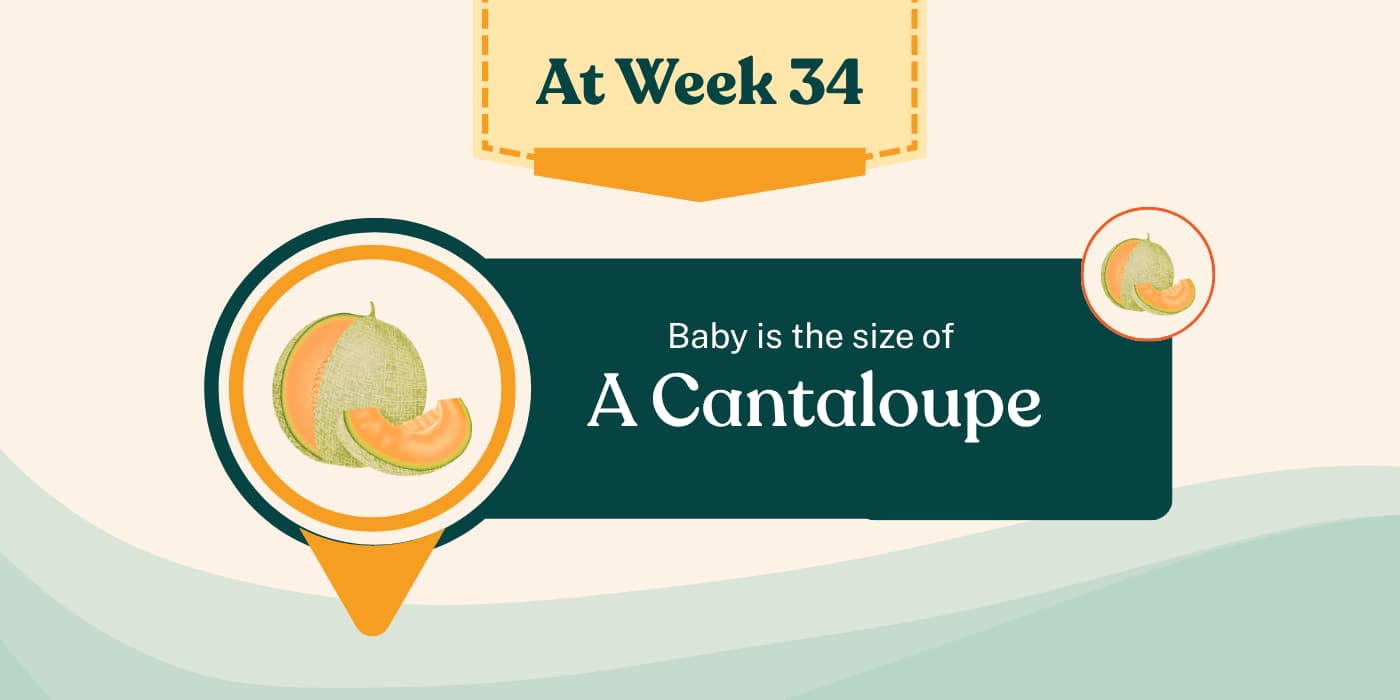Your Pregnancy at Week 34
Science photo library

Written by Mindsmaking Medical Writer
Fact Checked by Mindsmaking Professionals
1st, December, 2025
At 34 weeks, you're 6 weeks from your due date. Babies often arrive a bit early or late, so continue with prenatal appointments to ensure a healthy delivery.
At week 34 of your pregnancy, you're nearing the final stretch, with 6 weeks until your due date. It's normal to feel like the end is taking a long time to arrive, but remember that most babies don't arrive exactly on their due date. They might come a few weeks earlier or later.
Each pregnancy is unique, so it's important to keep up with your prenatal appointments. Your healthcare provider will monitor your progress and ensure everything is on track for a healthy delivery.
Key Takeaways
After birth, the brain triples within the first year, reaching about three-quarters of an adult's size by age one.
Your baby measures around 18.19 inches and weighs about 2146 grams, comparable to a cantaloupe.
You might experience blurry vision or shifts in near- or far-sightedness, and your eyes may feel irritated or dry. However, these changes are typically temporary.
At this stage, the top of your uterus is about 5 ½ inches (14 cm) above your belly button, but remember that every pregnancy is unique, so your measurements may differ from those of other women.
Increased discharge is common due to pregnancy hormones. Use panty liners for comfort, but avoid washes or wipes to prevent infection.
If you start having contractions, contacting your doctor immediately is important. Although your baby is considered preterm at this stage, some women do go into early labour.
Engaging in moderate-intensity aerobic exercises, such as brisk walking for at least 150 minutes per week, can relieve discomfort like back pain and bloating.
Attending prenatal care appointments with your partner can offer much-needed support and help you prepare as a team for the upcoming birth.
As your due date nears, you might want to try a perineal massage. This practice helps soften and stretch the pelvic floor muscles, making them more prepared for vaginal birth.
Take a peek
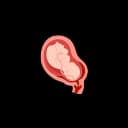
The Vernix
The thick, waxy, cheesy coating(vernix) on your baby's skin has thickened. This substance regulates your baby's temperature, prevents skin from losing moisture, and contributes to their immune system.
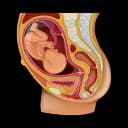
Poking
You may be able to see body parts like tiny hands and feet through your belly as your baby grows.

Testicle Descent
If you're expecting a boy, his testicles move from his abdomen to the scrotum. This is a natural part of development that usually happens towards the end of pregnancy.
Baby Development at Week 34
This week, your baby is approximately 18.19 inches long and weighs around 2146 grams, about the size of a cantaloupe. The brain is actively developing, forming millions of complex connections necessary for learning once they're born. As a result, your baby might sleep more and even dream, which can be detected by the presence of rapid eye movement (REM) during sleep. The brain won't stop developing after birth; it will triple in size within the first year, reaching about three-quarters of an adult brain size by age one. The lungs are also maturing well, so while babies born now are less likely to need significant breathing assistance, they may still require extra care and monitoring in the neonatal nursery. Your baby's tiny fingernails are likely extending to their fingertips.
Much of your baby's lanugo, the fine, downy hair covering their body, is disappearing, though some may remain at birth and fall away shortly after. Your baby's bones are mostly hardened, except the skull. The baby is gaining weight as fat accumulates under the skin, which is crucial for temperature regulation. Due to the limited space, your baby's legs are bent and held close to the body, leading to fewer movements but more noticeable shifts, such as a foot or hand pressing against your belly. The vernix caseosa, a protective coating on your baby's skin, is also thickened to regulate temperature, prevent water loss, and support immune function(4).
If you're having a boy, his testicles descend from his abdomen into the scrotum. After birth, his genitals might appear swollen because of extra fluid or a surge of hormones, but this swelling usually subsides within a few days(6).
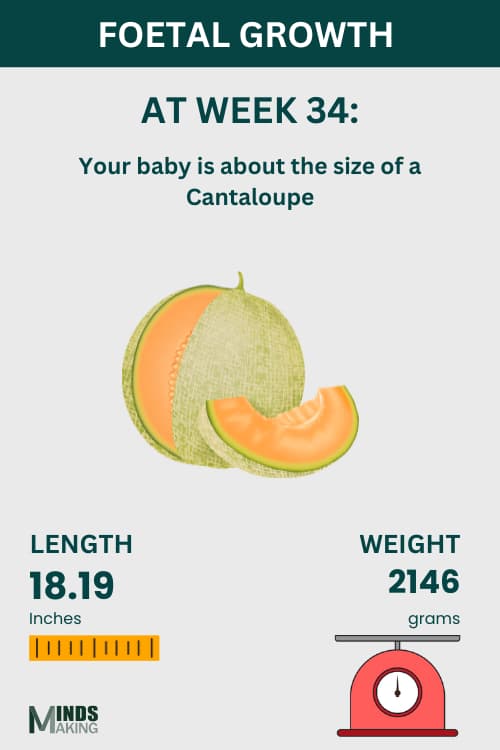
Body Changes at Week 34
You'll likely notice more weight around your baby's midsection as your baby grows. Aim to gain up to 1 pound per week unless your doctor advises differently. You might also feel bloated due to fluid retention. It's also common for some women's belly buttons to shift from an innie to an outie at this stage, which is normal. If your belly button feels particularly sensitive, using a bandage can help prevent irritation.
This week, you might experience vision changes such as blurriness or shifts in near- or far-sightedness. Your eyes may also feel more irritated or dry. These issues are usually temporary, so there's no need to rush into getting a new prescription. You can use over-the-counter lubricating eye drops to alleviate dryness. If you wear contact lenses, switching to glasses might be more comfortable. Your vision should return to normal after your baby is born. However, vision changes can sometimes indicate preeclampsia, so report any significant changes to your doctor.
Additionally, the pressure from your growing uterus and baby may lower your blood pressure, making you feel dizzy or lightheaded when standing up quickly. To prevent this, rise slowly and sit or lie down if you faint.
Read This Next
No posts available
Baby Bump At Week 34
At this stage, the top of your uterus is about 5 ½ inches (14 cm) above your belly button. Remember that every pregnancy is unique, so your measurements may differ from those of other women. What matters most is that your uterus is growing steadily. Typically, the amount of amniotic fluid peaks between 34 and 36 weeks. By 37 weeks, the amniotic fluid starts to decrease, making more space for the baby. This fluid is reabsorbed by your body, which also helps increase the room available for your baby to move.
Pregnancy Symptoms at Week 34

Constipation
Constipation is a common issue during pregnancy, affecting about half of women. This happens because the hormone progesterone, which increases during pregnancy, relaxes muscles throughout the body, including those in the digestive tract. As a result, food moves more slowly through your system, leading to constipation. To help manage this, drink plenty of water to keep your digestive system regular. Additionally, reduced physical activity due to discomfort can worsen constipation. To prevent it, try to stay active, drink lots of water, and eat high-fibre foods. Over-the-counter stool softeners can help, but avoid laxatives. Managing constipation effectively can help you feel better and prevent issues like haemorrhoids.

Discharge
During pregnancy, it's common to experience an increase in vaginal discharge, and this may become more noticeable as you approach your due date. This increase is due to pregnancy hormones boosting blood flow to the pelvic area. While the discharge is typically harmless, panty liners can help you stay comfortable. However, avoid using washes or wipes in the vaginal area, as they may disrupt the natural balance and increase the risk of infection.

Fatigue
By week 34, you may be experiencing fatigue again, though it might not be as intense as in the first trimester. This tiredness is normal due to the physical demands of pregnancy and the disruption of sleep from frequent trips to the bathroom and discomfort. Difficulty sleeping is common in late in pregnancy, but if it's starting to affect your ability to function, consult your healthcare provider. They can offer strategies for better sleep and suggest safe sleep aids if needed. Additionally, persistent fatigue could indicate issues like iron deficiency, anaemia or depression, which may require medical attention.

Blurry vision
Hormonal changes, fluid retention, and lack of sleep during pregnancy can cause your vision to feel slightly off or blurry. This is often a normal, temporary symptom of pregnancy. However, if you experience blurry vision, headaches, rapid weight gain, or significant swelling in your hands, feet or face, it could be a sign of preeclampsia. This serious condition requires immediate medical attention. Be sure to inform your OB about these symptoms promptly.
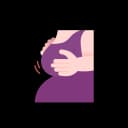
Fuller breast
As you approach the final weeks of the third trimester, your breasts are likely becoming even fuller, which can cause discomfort due to stretching skin and itching. While moisturizing lotion can offer some relief, a well-fitting bra is also crucial for comfort. Many speciality stores and department stores have bra fitting specialists who can help you find a bra that provides the right support. As your body changes, you might need to adjust the strap length or use a bra clasp extender, both during the last weeks of pregnancy and in the initial months after childbirth.
Pregnancy Concerns at Week 34
If you start having contractions, contacting your doctor immediately is important. Although your baby is considered preterm at this stage, some women do go into early labour. By 34 weeks, your baby has a strong chance of being delivered healthily. If contractions begin, record their duration and frequency, as your healthcare provider will need this information to assess your situation. Additionally, you should call your doctor if you notice any vaginal bleeding, fluid leakage, severe abdominal or pelvic pain, or a severe headache, as these symptoms could indicate complications.
Health Tips for Pregnancy Week 34
Stay hydrated
Although it might seem counterintuitive, drinking plenty of fluids can help your body eliminate excess fluids, according to research from 2021. It can also help reduce bloating and fluid retention. When you're well-hydrated, your body is more efficient at removing excess fluids. When you are dehydrated, your body tends to hold on to water as a way to protect itself. Staying hydrated is also crucial for your health and your baby's development, as it supports your body's overall function and helps maintain amniotic fluid levels.
Eat a balanced diet
Eating nutritious foods is crucial for both your health and your baby's well-being and for managing appropriate weight gain during pregnancy. Gaining too much weight can raise the risk of several complications, such as high blood pressure and preeclampsia, a condition that can affect both mother and baby. It can also increase the likelihood of needing an emergency cesarean section (C-section) for delivery.
Reduce salt intake
Dealing with swollen feet can be challenging, and consuming too much salt can worsen the problem because salt causes your body to retain more fluid. Avoid adding extra salt to your meals and be cautious with prepared foods by choosing low-sodium options whenever possible to manage swelling. This can help reduce fluid retention and alleviate discomfort.
Stay active
Physical activity can alleviate discomforts like back pain and bloating during pregnancy. The National Institutes of Health suggests engaging in moderate-intensity aerobic exercises, such as brisk walking, for at least 150 minutes weekly. This activity level can help improve overall well-being and ease common pregnancy-related symptoms.
Do prenatal yoga
Prenatal yoga has been shown to potentially enhance sleep quality for women in their third trimester, as indicated by a 2021 study. The gentle stretching, relaxation techniques, and breathing exercises involved in prenatal yoga can help reduce stress, ease physical discomfort, and promote relaxation, which may contribute to better sleep. This can be particularly beneficial during the later stages of pregnancy when sleep disturbances are common.
Advice for Partners
In the final weeks of pregnancy, attending all prenatal care appointments with your partner is beneficial. These visits often become more frequent, and your presence can offer much-needed support. Being there together helps you both prepare as a team for the upcoming birth, fostering a sense of unity and ensuring you're both informed about the process.
You can also support your partner by assisting with perineal massage, which helps stretch the perineal muscles and may reduce the likelihood of needing an episiotomy. This massage is a practical exercise to aid in labour, not a sexual activity. For safe and effective massage techniques, consult your healthcare provider. You and your partner can schedule these massages weekly as she approaches labour.
Pregnancy Checklist for Week 34
- As your due date nears, you might want to try perineal massage. This practice helps soften and stretch the pelvic floor muscles, making them more prepared for vaginal birth.
- Consider hiring a postpartum doula who can help you adjust to life with a newborn by offering care, advice, and support in the early days or weeks after birth.
- If you haven't yet created a birth plan, now is a great time to do so if you want one. A birth plan outlines your preferences for labour and delivery, helping you communicate your desires to your healthcare provider.
- If you have some free time this week, preparing and freezing meals for after your baby arrives is a great idea. Stocking up your pantry and pre-cooking meals now will save you time and effort later.
- If you haven't yet selected and installed a suitable baby car seat, now is the perfect time to explore your options.
Frequently Asked Questions
How big is my baby at pregnancy week 34?
Your baby is now about the size of a cantaloupe, weighing approximately 2146 grams and measuring up to 18.19 inches. It has been growing consistently and is now rounder and cuter, with fat layers giving it a more filled-out appearance.
Is it safe to give birth at 34 weeks?
At 34 weeks, your baby is nearing the end of pregnancy but isn't considered full-term yet at 37 weeks. Despite this, a baby born at 34 weeks has a strong chance of being healthy and robust, similar to a full-term baby. However, they might need some extra time in the hospital for monitoring and to ensure everything is okay before they are ready to go home with you.
What are the signs of premature labour at week 34 of pregnancy?
If you suspect you're going into labour at 34 weeks, contact your healthcare provider immediately. Early labour symptoms can include cramping, contractions, increased pelvic pressure or pain, blood discharge, lower abdominal or back pain, or leaking pink or clear fluid. If you are experiencing these signs, seeking immediate medical attention is crucial, as early intervention is key to ensuring your and your baby's health and safety.
What should I expect at 34 weeks pregnant?
You might be feeling quite exhausted right now, making work more challenging. It's important to ask for help if you need it and consider working from home to avoid the strain of commuting. At this stage, some women find relief from other pregnancy symptoms as their baby begins to move into the pelvis in a process called "engagement." This shift can create more space in your belly, potentially reducing breathlessness and heartburn. Although not everyone will experience this relief, it can be a welcome change if you do.
Is it safe to have intercourse at 34 weeks pregnant?
Unless your doctor has advised pelvic rest due to conditions like placenta previa, having intercourse is generally safe until your water breaks. After your water breaks, it's recommended to avoid sex to reduce the risk of infection. Communicating openly with your partner about what feels comfortable and what doesn't. If your growing belly makes certain positions challenging, don't hesitate to experiment with different ones to find what works best for both of you.
Was this article helpful?
How many stars are you giving this article?
Leave a comment
Your email address will not be published.
